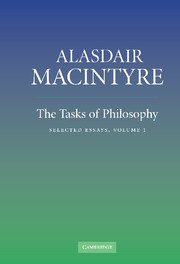Book contents
- Frontmatter
- Contents
- Preface
- Acknowledgments
- PART I DEFINING A PHILOSOPHICAL STANCE
- 1 Epistemological crises, dramatic narrative, and the philosophy of science
- 2 Colors, cultures, and practices
- 3 Moral relativism, truth, and justification
- 4 Hegel on faces and skulls
- 5 What is a human body?
- 6 Moral philosophy and contemporary social practice: what holds them apart?
- PART II THE ENDS OF PHILOSOPHICAL ENQUIRY
- Index
5 - What is a human body?
Published online by Cambridge University Press: 05 June 2012
- Frontmatter
- Contents
- Preface
- Acknowledgments
- PART I DEFINING A PHILOSOPHICAL STANCE
- 1 Epistemological crises, dramatic narrative, and the philosophy of science
- 2 Colors, cultures, and practices
- 3 Moral relativism, truth, and justification
- 4 Hegel on faces and skulls
- 5 What is a human body?
- 6 Moral philosophy and contemporary social practice: what holds them apart?
- PART II THE ENDS OF PHILOSOPHICAL ENQUIRY
- Index
Summary
To the question “What is a human body?” I intend to propose seven preliminary answers: that it is an animal body with various powers of movement, some voluntary and directed; that it is a body whose movements afford expression to intentions and purposes that thereby possesses a certain directedness; that, as an expressive body, it is interpretable by others and responsive to others; that, as an interpretable body, a variety of its characteristics are signs whose meaning others can understand; that its directedness has the unity of agency; that it cannot be adequately understood except in terms of the social contexts in which it engages with others and others with it; and that it is in certain respects enigmatic, a source of puzzlement, since alone among animal bodies it occasionally emits the question “What is a human body?” and directs its powers towards giving an answer to that question.
An incautious reader may suppose that in giving these answers I am making philosophical claims. And it is true that they will provide what I take to be grounds for rejecting certain standard types of philosophical theory which give or entail certain kinds of account of the body, namely, those types of theory that are committed to some version of dualism, whether Platonic or Cartesian, and those types of theory that are committed to some version of materialism or physicalism.
- Type
- Chapter
- Information
- The Tasks of PhilosophySelected Essays, pp. 86 - 103Publisher: Cambridge University PressPrint publication year: 2006
- 3
- Cited by

